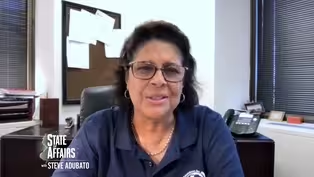State of Affairs with Steve Adubato
The Hispanic Community's Impact on the US Economy
Clip: Season 7 Episode 31 | 9m 37sVideo has Closed Captions
The Hispanic Community's Impact on the US Economy
Steve Adubato welcomes Arturo Osorio, Ph.D., Associate Professor of Entrepreneurship at Rutgers Business School and Secretary of the Board at the Statewide Hispanic Chamber of Commerce, to highlight the Hispanic community’s impact on the U.S. economy and the ongoing discrimination that they face.
Problems playing video? | Closed Captioning Feedback
Problems playing video? | Closed Captioning Feedback
State of Affairs with Steve Adubato is a local public television program presented by NJ PBS
State of Affairs with Steve Adubato
The Hispanic Community's Impact on the US Economy
Clip: Season 7 Episode 31 | 9m 37sVideo has Closed Captions
Steve Adubato welcomes Arturo Osorio, Ph.D., Associate Professor of Entrepreneurship at Rutgers Business School and Secretary of the Board at the Statewide Hispanic Chamber of Commerce, to highlight the Hispanic community’s impact on the U.S. economy and the ongoing discrimination that they face.
Problems playing video? | Closed Captioning Feedback
How to Watch State of Affairs with Steve Adubato
State of Affairs with Steve Adubato is available to stream on pbs.org and the free PBS App, available on iPhone, Apple TV, Android TV, Android smartphones, Amazon Fire TV, Amazon Fire Tablet, Roku, Samsung Smart TV, and Vizio.
Providing Support for PBS.org
Learn Moreabout PBS online sponsorship[INSPRATIONAL MUSIC STING] - We're honored to be joined by Dr. Arturo Osorio, who is Associate Professor of Entrepreneurship at the Rutgers School of Business and the Secretary of the Board at the statewide Hispanic Chamber of Commerce.
Good to see you, Arturo.
- Good to see you, Steve.
- We are gonna put up the website for the Hispanic Chamber.
We've had your CEO on, Carlos, talking about a whole range of important issues.
I wanna revisit some of them now.
The Hispanic community and their representation in the business community, how prominent is the Hispanic business community?
- Very good question.
So if you were to take the Hispanic community in the US and put it in a ranking across the world, the Hispanic community will be about the 5th largest GDP of the world.
In other words, if we're lookin' into yes, the 5th, so if we're lookin' into the numbers, the Hispanic community in the US brings about 97 billion, that's billion with a B, billion dollars into the US economy.
This is mostly because the large number of business and the youth of the community.
So we're talking that across the US we have about 140,000 Hispanic business contributing to the economy, providing access to products and services.
In New Jersey alone, that number is about 20,000, I believe.
The chamber represents 6,500, so it's a big number.
- Lemme follow up with this.
As expansive as the Hispanic business community is everyone involved in a business, particularly, small business, but all business, our business, greatly affected by the pandemic.
As we're doing this program March of 2024, will represent four years into this global pandemic.
- Yes.
- How would you argue that, or what would you say the Hispanic business community's greatest challenges are from recovering and the effort to recover from the pandemic based on the incredibly difficult challenges they faced, any different than the rest of us?
- Very different in terms of how it connects and the type of challenges.
So to recover, we need money.
You need to buy materials, you need to bring back marketing, you need to connect people.
So if I am a non-Hispanic business requesting a loan, let's go for a small business.
We know the numbers, the small business is defined by the Small Business Administration of the US, so we're talkin' tiny numbers, $100,000.
I am a non-Hispanic business looking for $100,000 in a loan.
I have about 50% chance to get my loan.
Same business, same amount of money, now the face on the picture is Hispanic, 20% chance to get the loan.
- Why?
- If we go, why?
That's a very good question.
There are multiple elements to it.
Number one, the way that we present ourselves tend to be more shy.
The way that we record the numbers, sometimes it's more difficult.
We tend to be more cautious when we report.
We tend to trust less and tend to work more in close-knit communities.
That is for the inside part of it.
On the outside part of it, there's discrimination.
There is some intrinsic bias that we don't look at it.
There are some product, this has been also translated to artificial intelligence recordings.
So if you are looking for people applying for loans or for jobs and you remove the gender and the name of the person, so it becomes non-denominational in terms of ethnicity or gender, you are equally likely to get it.
You apply gender, you apply name, names indicate ethnicity, you drop the chances.
- So you're saying, gender part of it, but if someone's name is Gonzalez versus Adubato or Jones, and the credentials are the same, the application is the same, the capital formation is the same, finish that.
- This is what happens.
We tend to have certain biases, and these biases imply that we see certain groups more likely, more suited to perform a job.
So for example, I can give you a case that it happened to me, and this is, I'm going to go into gender.
I was working about 10 years ago with an entrepreneur.
This individual had about 10 years work experience running a daycare.
It was a daycare, 15 kids, was looking to grow the daycare, applied for a loan, was denied, problem was a male caregiver.
So we foresee people who provide childcare to be more likely female than male.
If you see a situation in the mall, where a kid is crying, ethnicities not matching, older person happens to be a male, we grow suspicious.
We see a kid crying on the mall, say different ethnicity, younger kid crying, we think that must be a nanny or the mother.
So, we have some biases.
- Arturo, let me ask you something.
- Sure.
- I often ask people, when I feel their passion, how much they believe deeply in the work they're doing and the people they serve, I'm always curious, where does your passion for the scholarship, the research, the work that you do, particularly at Rutgers School of Business, where does that passion come from?
- Before being a professor, I was a CFO for 100 million R and D project, US/Mexico.
The project was phenomenal.
We needed to develop the technology.
We needed to create things that they had never existed before.
We were given one task, do all the technology and don't forget for the nearby local communities.
So how difficult can it be?
We have world class scientists, PhD people, and we were creating things that had never seen before.
We fail on the social.
So at that point, I asked myself, how come when we have all the resources at hand, all the knowledge and even the mandate, we are not able to deliver?
So at that point, I have a conversation with my wife.
She was finishing her PhD at the time, says, "How do you feel if I quit my job and I go back to school?"
(Steve laughs) So, quit my job, and I ask, "What do we do not know?"
Because if we know what we know, we can ask the question, but when we ignore what we don't know, we don't know what to ask.
So, went back to school, and I start asking, "How do we conceptualize businesses?
"How come sometimes we have problems with businesses?"
And the answer was simple, and that's how I became a professor at Rutgers.
Most people see businesses as a tool of exploitation, so you create a business because you want to make money.
So you struck money from communities.
However, and this is one thing that make different Hispanic business and why is allowing Hispanic business to grow despite of.
We see business as the opportunity to provide access to products and services, so when you create business to resolve problems, your business becomes strong.
So that's what I became and that's how I feel passionate.
For me, creating businesses, the opportunity to make communities better by solving problems in exchange for resources.
- This is personal for you.
- Very personal.
- We appreciate you joining us, Professor, and we look forward to continuing the conversation with you because we are not doing enough.
I'll speak on behalf of our production company.
We are not doing nearly enough to explore, to analyze, to make sense of issues disproportionately affecting the Hispanic community.
Thank you, Professor.
- No, thank you Steve, I appreciate the opportunity.
- You got it, stay with us, we'll be right back.
- [Narrator] State of Affairs with Steve Adubato is a production of the Caucus Educational Corporation.
Celebrating 30 years in public broadcasting.
Funding has been provided by The Fidelco Group.
The New Jersey Education Association.
PSEG Foundation.
The Russell Berrie Foundation.
New Jersey’s Clean Energy program.
The New Jersey Economic Development Authority.
Holy Name.
Robert Wood Johnson Foundation.
And by The Port Authority of New York and New Jersey.
Promotional support provided by CIANJ, and Commerce Magazine.
And by BestofNJ.com.
- Hi, I'm Abbie.
You might see me as an ordinary person, but I've been living with a brain injury since 2018.
Opportunity Project gave me hope and I've gained confidence through job skill training and helping my family.
Despite my challenges with memory, I see a possibility to keep improving.
- [Narrator] If you have a brain injury, you don't have to face your road to recovery alone.
Learn more about Opportunity Project and its partnership with Children's Specialized Hospital.
The Importance of Minority Representation in Education
Video has Closed Captions
Clip: S7 Ep31 | 10m 8s | The Importance of Minority Representation in Education (10m 8s)
The Wight Foundation and the Incentives for Students
Video has Closed Captions
Clip: S7 Ep31 | 8m 47s | The Wight Foundation and the Incentives for Students (8m 47s)
Providing Support for PBS.org
Learn Moreabout PBS online sponsorship
- News and Public Affairs

Top journalists deliver compelling original analysis of the hour's headlines.

- News and Public Affairs

FRONTLINE is investigative journalism that questions, explains and changes our world.












Support for PBS provided by:
State of Affairs with Steve Adubato is a local public television program presented by NJ PBS

